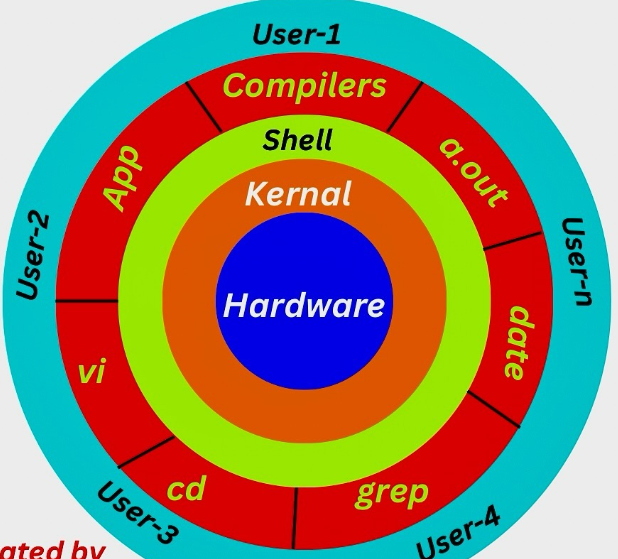Education Desk, Delhi Magazine: The kernel is a crucial component of an operating system like UNIX, linux etc, serving as the core that interacts directly with the hardware and manages system resources. Here’s an overview of the kernel and its functions:
1. Definition:
- The kernel is the central part of an operating system, responsible for managing hardware resources and providing essential services to higher-level software.
2. Functions of the Kernel:
- Process Management:
- Creation and termination of processes.
- Scheduling processes to run on the CPU.
- Context switching between processes.
- Memory Management:
- Allocation and deallocation of memory for processes.
- Virtual memory management and paging.
- File System Management:
- Interaction with the file system for reading, writing, and managing files.
- Implementation of file permissions and access control.
- Device Drivers:
- Communication with hardware devices.
- Loading and unloading of device drivers.
- Providing a uniform interface to applications for different devices.
- System Calls:
- Interface between user-level applications and the kernel.
- Programs request services from the kernel through system calls.
- Security and Access Control:
- Enforcing access control policies.
- Managing user authentication and authorization.
- Networking:
- Handling network communication and protocols.
- Implementation of networking protocols such as TCP/IP.
- Interrupt Handling:
- Responding to hardware or software interrupts.
- Managing signals and exceptions.
- Kernel Modules:
- Dynamically loadable code that extends the functionality of the kernel.
- Allows for adding or removing features without rebooting the system.
- System Initialization:
- Bootstrapping the system during startup.
- Initializing system components and services.
3. Types of Kernels:
- Monolithic Kernel:
- All kernel services are in a single, large binary.
- Efficient but less modular.
- Microkernel:
- Basic functions are in the kernel, and other services run as separate processes.
- More modular but can have a performance overhead.
- Hybrid Kernel:
- Combines features of both monolithic and microkernel architectures.
- Strives for a balance between efficiency and modularity.
4. Importance:
- The kernel plays a critical role in maintaining the stability, security, and performance of the operating system.
- It serves as an intermediary between applications and hardware, providing a standardized interface for software to interact with the computer’s resources.
In summary, the kernel is the heart of an operating system, managing the essential functions that enable applications to run and interact with the hardware. It plays a crucial role in ensuring the smooth and secure operation of the entire computing system.

